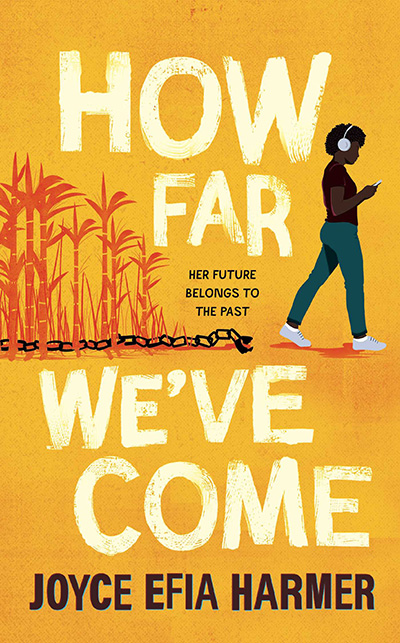How Far We've Come*
By Joyce Efia Harmer (Simon & Schuster)

*Shortlisted
Review by Otis, Coombe Dean School, Plymouth
I really enjoyed reading How Far We’ve Come. The way that the author uses informal vocabulary while writing from Obah’s perspective helps to amplify her personality and show that her literate ability is limited - this sometimes made it hard to understand though. Her views on modern inventions and ways of life are quite accurate and were very funny to me - for example, she was confused about how cars move without being drawn by horses and assumed there must be tiny horses underneath, or the fact that she didn’t understand televisions and thought they were mirrors that trapped tiny people inside. The author was also very subtle about the fact that Jacob loved Obah and hinted at it all through the book until finally confirming it close to the end. The ending was brilliant, the fact that Murreat finally speaks shows that she was probably just choosing not to speak much and finally did because that was the best time to do so; the pomander drifting gently away afterwards was a perfect ending - it had done all it needed to and was now floating away to eventually be found by someone else. This book is an amazing story of love and hope even when times are hard - it moved me deeply.
Review by Anonymous, Edmonton County School, London
Having learnt about slavery in quite depth, I didn’t expect to take much away from this book. However, Oba, a young girl born a slave, really emphasises the dreadful nature of racism, in both modern and past societies. This makes one wonder about the deep-rooted inherent discrimination that goes on in the society in which we live in today, and more so whether things have changed because society has wanted to change or because they have been forced to. Through this book, Joyce Efia Harmer sparks a flame of curiosity and passion within the reader, and overall displays a formidable message. After all, if we don’t take matters into our own hands who will?
Review by Jessica, Thomas Telford School, Shropshire
I found this an impactful dive into racism in the modern day in comparison to the more obvious racism of the 1800s. It brings to light the more subtle racism as well as police brutality during the current day. I liked Obah’s development as she grew in confidence and her realization that the world isn’t as great as Jacob claims. In the book there were many characters who were creatively structured to be unlikable in a sense with many characters being portrayed both realistically for the time period but also in a way that makes them either not easy to like or downright awful. Jacob can be seen as unlikable despite good intentions which could portray most of the white population in the current day. Alongside this his mother's friend are portrayed as subtle racists who make many assumptions about Obah which are stereotyping her and almost boxing her into one category. Within the book readers learn a lot about the extent of the horrible conditions the slaves were put through during slavery on the plantations. This was perfectly portrayed through the characters of Captain Thorne who was a cruel character as well as Miss Frida who despite being seen as kind by Obah has hit her with a hairbrush which only adds to the harsh reality of livelihood on a plantation for many slaves. The novel immerses readers in the brutal reality of slavery. It sheds light on the resilience of those who fought for freedom. Through Obah’s experiences, we glimpse the horrors faced by enslaved individuals and the strength required to survive which only adds a sympathetic view for the reader as we learn more about the plantations and modern-day racism which can be seen as impactful to our everyday lives. The intertwining of past and present challenges our perception of time. It prompts reflection on the enduring impact of history. The sacrifices made by characters evoke questions about the true cost of freedom. This book has made me want to question the extent to which society has progressed past slavery and how racism is still heavily ingrained into our societal views. Overall, “How Far We’ve Come” is a must-read for those who appreciate historical fiction with a touch of magic. Its exploration of human connection, sacrifice, and the legacy of slavery lingers long after the final page. I would recommend this to my peers as it is a deep look in which the reader can learn a lot about the pivotal impact racism has on both a small and large impact. In summary, this novel invites readers to journey through time, confront injustice, and celebrate the resilience of the human spirit.

